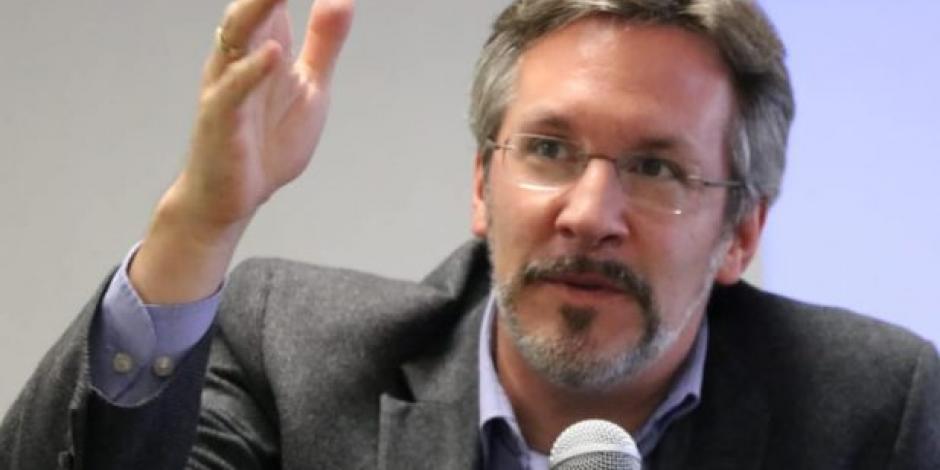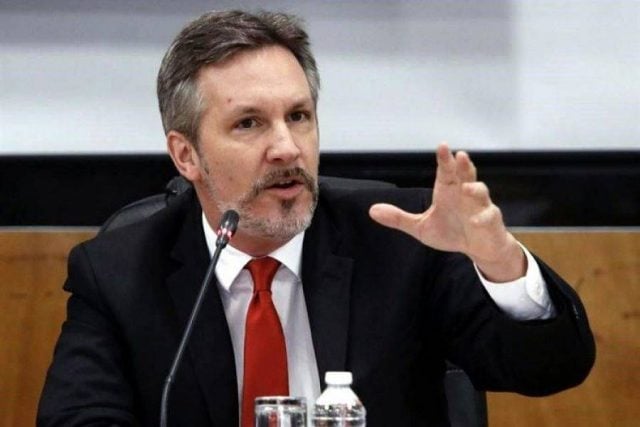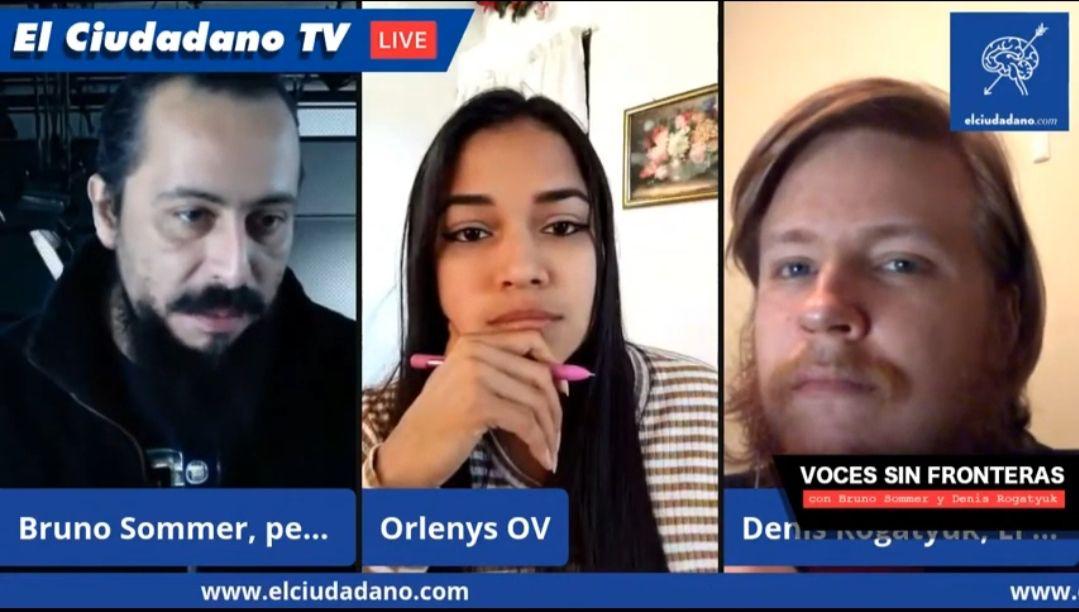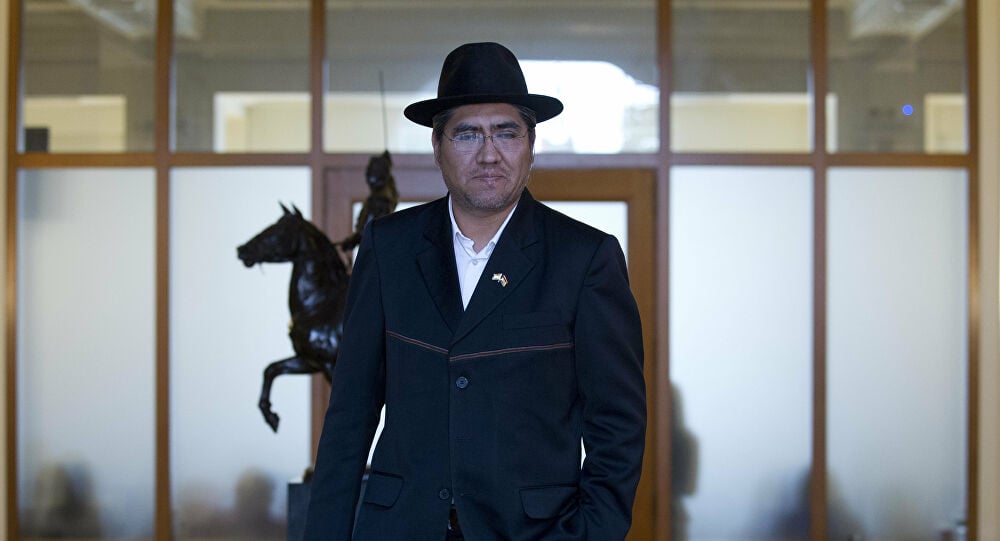John Ackerman, one of the most prominent Mexican journalists and editorial director of the Mexican Law Review, noted that the president of Mexico, Andrés Manuel López Obrador, has been a strategist, from day one, in his relationship with the United States.
In an interview in Voces Sin Fronteras, led by Bruno Sommer and Denis Rogatyuk, the also director of the University Program for Studies on Democracy, Justice and Society (PUEDJS) at the National Autonomous University of Mexico, said that the Fourth Transformation project developed by AMLO is a response to the neoliberal system.
«It is precisely the Mexican Pinochetists who are scared by the advance of the Fourth Transformation, by the end of their privileges», he said when commenting on the «Yes for Mexico» campaign, led by the head of Coparmex, whose logo is very similar to the one used in Augusto Pinochet’s campaign for the 1988 referendum.
By Bruno Sommer and Denis Rogatyuk
Given the triumph of Joe Biden in the United States, what do you think will be López Obrador’s next moves on the board of international relations and what can we expect from Donald Trump?
First of all, I think this could extend beyond December 14 in the United States. I published a couple of articles in La Jornada of México, analyzing the political scene in the US. The final conclusion of the election, the formal announcement of the winner, will not occur until the first week of January.
Once the new Congress is installed, starting in January, it will be the 5th or 6th of that month of 2021, a joint session of Congress is held, the Senate together with the Chamber of Deputies, and it is presided over by the current Vice President of the Republic , Mike Pence.
Pence has the responsibility, according to the US Constitution, to call, to announce the electoral votes for each of the states that were cast on December 14, which are cast on that day but are not validated until this session of the joint US Congress.
The vice president, as the official who presides over that session, has within his constitutional powers to question the validity of some of those key state votes, for example, if there are reasoned doubts regarding the transparency of the count or on the process of selecting the voters. In some states, the vice president could simply – as we say in Mexico ‘by his guns’ – say ‘well I’m not going to count the voters of Pennsylvania, or Georgia, or Nevada, or Arizona, because there is a cloud of uncertainty about the electoral process, then as there is no certainty they will not count for the President of the Republic and we discard this and move on’.
In this way, Vice President Pence has in his hands the possibility of giving Trump the victory, not only annulling Biden’s victory, but literally handing over the presidency to Trump. The final vote in that session, endorsing the total or partial count, is one that is made nominally by states of the United States Republic, that is, each state delegation, each set of deputies from each state, have only one vote in the final vote, and it turns out that Trump won more states than Biden, beyond the fact that he lost the popular vote and that, apparently, he also lost in the electoral college, he still has a majority. Trump has about 28 of the 50 states that voted for him, many small ones, of course, but in this US constitutional formula, they could finally vote to endorse Pence’s rigged count and we would already have a second Trump term.

It sounds incredible, but in reality it is not. It is a reflection of how outdated the US political-electoral system is, that it has not been fundamentally updated since the 18th century, there have been reforms, adjustments, but nothing else.
Now, in general, the Supreme Court of Justice has ruled that it is not correct for an elector of those states – for example – to betray the popular mandate of his state. That is another risk that has been placed on the table because as there is no direct and popular vote for the President of the Republic, but rather indirectly through these electors who are selected by the state Congresses. There are indicative popular elections but strictly speaking there is no obligation for Congress to respect that popular vote and name the electors that correspond to that vote and, secondly, in the electors selected by the corresponding state Congress there is no strict obligation that they comply with the mandate that Congress is giving them.
Well, the Supreme Court of Justice has intervened, it has said yes – of course – but the system is totally out of date. They do not have a national electoral institute in the US, there is no direct and popular vote for the President of the Republic, there are no real limits regarding the money that is spent on the campaigns. There are about 18 billion that were spent on this campaign, the most expensive election in the history of mankind.
More than 5 million voters were excluded from their right to vote for having served a sentence in jail, the majority of these African Americans, Latinos, the so-called minorities, simply do not have the right to vote in the United States. Another 10 million Mexicans in particular, although there is a broader community of Latin Americans who live and work there but they do not have papers, they are not documented, so they could not vote either.
I am not a fan of Trump, by any means, but it is important to see this electoral political crisis that the US is experiencing today, not only as a result of Trump’s irresponsibility – he is responsible, that we cannot ignore – but it is not only his personal irresponsibility.
What allows his personal irresponsibility to generate this systemic crisis is because the system itself has very deep cracks, which are the reasons for reflection by Americans themselves and by all who at some point saw the United States as a model of a Democratic system.
How is the political ‘chess player’ López Obrador going to move internationally?
We will see. A very important determination of López Obrador at this juncture has been not to send a tweet celebrating Biden’s victory, as a large number of world leaders have done, but to reserve prudently, hoping that the public, electoral and legal institutions of the The US are the ones that determine who the President-elect really is, and at that moment, well, congratulate him, but do not go away with the feint by following the media that are already announcing an elected President, or the other world leaders who also announce their President-elect, which is actually the style of the US, as they intervene the world.
If you remember, with the coup against Evo Morales it was also the same. The media and the other international leaders said that there was a fraud, that they did not recognize Evo Morales, they pressured the military to pressure Evo themselves so that he had to quit. Or Juan Guaidó, which really was horseplay, but precisely because of how ‘gross’ it all was, we can see, in a very transparent way, how the electoral process in general is viewed from the US logic. Institutions and laws have to be complied with, but the important thing is what the corporate media and the international community of leaders say, who, in turn, are in many cases representatives of these financial circuits of capital, so there we have the same thing. Just like everyone the day after Guaidó named himself the president in charge of Venezuela, today Biden has also been named the winner by CNN and Twitter and now all the leaders of the world saying that ‘Biden president’.
López Obrador has already experienced this situation himself, in 2006, there was a fraud made against him, international leaders congratulating Felipe Calderón before he had finished the process of ruling and evaluating the election that usually takes two months. So, with great dignity and respect for the sovereignty of the United States and for popular sovereignty in general, he says, «I am going to wait until there is a formal ruling, I don’t believe CNN, I believe the institutions». This is very important.

Now, from the United States and within Mexico, many commentators are saying that this is going to have a cost for López Obrador in his relationship with Biden, that in the end it is most likely that Biden will remain because the real power behind the throne, in the United States, is not politics but Wall Street and it does not suit them, no matter how much Trump is pro-corporate, Wall Street has already decided, they want Biden for stability and, in the end, Biden is going to stay for that, for no other reason but that.
But they say that Biden is going to be angry with López Obrador, that he is going to ‘collect the bill’ when he arrives, and it is likely that some sector of Biden’s people will try to do this. This is how politics works in the US. They are not very institutional, it is a myth that politics in the United States is very institutional, on the contrary, they are hypocrites, yes. but very passionate, and yes, surely a sector of Biden’s team will want to put themselves in a dignified way in front of López Obrador during the first weeks, but at the end of the day that does not matter, López Obrador is perfectly clear that the United States has no friends, they have partners, accomplices, some adversaries, but in the end the relationship between Mexico and the United States has to walk through the path of diplomacy, the law, so it doesn’t matter whether the US likes you or not.
With Trump, a good relationship was established, but that was not the important thing, what was really established was that López Obrador put his feet on the ground, and negotiated a way out of various problems and the intense relation that Mexico has with the United States because they share this huge frontier
In the same way it will be with Biden, surely there will be another public style, but that is not what is relevant, what is important is the underlying relationship and López Obrador will continue with his defense of sovereignty and with his respect for the relationship with the United States.
The Mexican opposition has constantly tried to portray AMLO as the Trump of Mexico or suggest that he acts in a submissive manner towards Trump. Will they try to align themselves more with the US Government against AMLO?
These are two narratives that the opposition in Mexico seeks to generate. One is that comparison of Trump-López Obrador, both are supposedly populists, from the right and from the left, but they are the same antidemocratic and authoritarian. And the other narrative is that López Obrador has subscribed to Trump’s dictates, and with López Obrador there is a loss of sovereignty.
The two theses are totally upside down, that is, what could be at some point, from a point of view of similar external political analysis between López Obrador and Trump, is their interest in the political sphere.
For many decades, politics has become a managerial agent of economic, national and international interests, and this has been called the good politics of consensus, the politics of the center or of social democracy, or of the responsible right. That politics has subsumed itself into the economic sphere, and Trump and López Obrador defend, and exercise, political leadership as such, but this does not make them the same and in many moments they even go beyond and, at least, separated from the economic powers. It sounds paradoxical to speak in that sense about Trump, because he is a great businessman, he promotes the interests of the great company, the transnationals. Of course, it is not to justify or legitimize his approach, but at the end of the day they see it, he is deeply irresponsible from the point of view of Wall Street, those who always want stability. López Obrador defends good politics, Trump bad politics, but at the end of the day it is politics.
In that sense, there could be some historical link between the two, because both are symbols of the exhaustion of the old system but nothing to do with it, in reality López Obrador is a democrat deeply committed to democratic freedoms, social justice, with the poor, With gender equality, the autonomy of the Judiciary, freedom of expression is one of its central axes and non-fraudulent elections. AMLO is a convinced democrat, and his leadership style has great leadership, moral strength, but it is not really, technically, a populist leadership, it does not shout or insult or divide, in fact, his morning speech (AMLo gives a sort of press conference every morning) every day is one of conciliation, unity and in favor of the poor.

Now, his visit to Washington, in the concrete relationship with Trump, has been fascinating, since the first day that López Obrador wins on July 1, 2018, the liberal, neoliberal right of Mexico in the US were salivating their mouths, desperate, wanting a conflict, a train crash between Trump and López Obrado. They wanted these two actors to blow themselves up in a sterile conflict and Trump did his part, he has always put his provocations, his tweets, but López Obrador from day one has been a great strategist, he has not fallen for that provocation, but has always been, in a very pragmatic way, able to generate agreements that benefit Mexico in the first place, but that do not necessarily harm the United States.
This visit to the White House was incredible, because everyone was betting that it would be a failure, that Trump was going to humiliate López Obrador, but in reality he was a great bullfighter, literally, although we do not support bullfighting because of its violence against the animals but the symbol is very beautiful, because it is what he did, he managed to tame the situation, avoid conflict and emerge as a winner defending the sovereignty of Mexico in many areas.
It is absolutely false that López Obrador is sacrificing national sovereignty in front of Trump, but quite the opposite. We are, for the first time in decades, recovering a sovereign foreign policy, a sovereign public security policy, a sovereign economic security policy, without fighting with the US, but there are very concrete advances.
There are people in Latin America who still don’t know the background of what is known as the Mexican Fourth Transformation (4T). What are the pillars and columns that support it? What is the degree of progress to date and what are, in your opinion, the weakest columns that should be strengthened?
It is very important to reflect on what is happening in Mexico, because it is symbolically and historically very important for the whole world. In fact, last week, here at the UNAM, from the research center that I direct, we had a forum for the whole week talking about this issue, not only about Mexico but about the world in general, about how to overcome neoliberalism in the post-pandemic era, although I believe that this will never happen, we will always be on the point of ‘exiting’ the pandemic, but in Mexico we are experiencing many very interesting things, which are not only important for Mexicans but for the world.
The central axes of the 4T, as we say, in general is a response to the neoliberal system. Mexico failed to join this pink wave that crossed all of Latin America with progressive governments of many styles, colors and flavors, from Brazil to Central America, Venezuela, even in Chile they were experimenting with some more progressive efforts, Ecuador, Bolivia, the entire continent, except for Colombia and Mexico, they were the ones that had been stuck in this long neoliberal night, as our friend Rafael Correa says, and we finally managed to turn it around. We would have achieved it before, in 1988 we would have been the first to set an example in the matter, but there was an electoral fraud in 88 that did not allow it. There was another electoral fraud in 2006, then I think there was also a third fraud in 2012. In other words, it was no longer a fraud at the polls but a ‘financing fraud’ with Odebrecht and other international financial powers and a massive purchase of votes.
Finally, after many attempts, in 2018 we broke with the neoliberal system. There is a real political alternation and this implies, first of all, which is what López Obrador has said, fighting corruption because neoliberalism is not a system, it is not only an economic theory, a focus on the market, privatization and a supposed competition.
This utopia that Karl Polanyi spoke of about the self-regulating market economy, is also a whole logic of looting and corruption. The privatizations of the 90s in all the Latin American countries are a very clear example of it. These privatizations were sold with the idea that it was to clean up, to avoid the corruption of the ‘bulky’ States to move the industries to the clean and competitive market when really what happened was the opposite. They handed over these companies to large wealthy families and those privatization processes were deeply corrupt that enriched a small oligarchy and, then, from that point on, of economic power already strengthened, it corrupted more and more the State with rigged contracts, agreements in the dark, with more public debt, just the opposite of neoliberal austerity, vote buying, corruption from the bottom up in the entire political system.
So, what López Obrador says is that his government manages to separate the public from the private, in a similar way – he says – like Benito Juárez, the ‘Benemérito de las Américas’, great Mexican president of the 19th century, who managed to separate the State and the Church. Today, López Obrador wants to repeat this effort, separating the public from the private, the Government of the big businessmen, and this does not imply a war against private property, the private sector, but rather that each one has their own sphere.
This sounds at first like an ideology, a very reformist, very social democratic approach, and it could be if you see it from a strictly theoretical approach, but in reality what this implies is a recovery of large areas of the Mexican State. The State understood not. only as government and institutions but in general, the relationship of the State with society, the recovery of large areas that were lost territories to the drug traffickers, for the oligarchs, for financial capital, for common crime, it is to recover those spheres for the public, the public sphere space, the entire judiciary, the police, the economy itself.
It is to put a stop to the disruption of the national oil company, Pemex, recover the small public markets, this is more local politics, but not stop aggressively, but simply applying the law, the Walmartization – for example – of Mexico, maintaining our traditions of local markets, all this to defend what is public in Mexico, it is very deep and revolutionary and this is because our Constitution is a revolutionary Constitution.
We continue today with the Constitution of 1917, which emerged from the Mexican Revolution, that was even before the Russian Revolution and all the revolutions of the 20th century, which was the century of revolutions. The first was the Mexican one and our Constitution continues to be revolutionary with very advanced concepts at the time, but today they are still super relevant and are still advanced. Many constitutions in the world still do not reach, after a hundred years, the advances we have on everything in terms of social rights, the right to land, work, health, education, water, culture, information.
So, recovering that revolutionary spirit of the Mexican Constitution from a separation of the public and the private implies a frontal war against the neoliberal system. We barely have two years, yes, there are very concrete advances although obviously there are frustrations. The people want more and that is good, that the people demand and that López Obrador himself recognizes that there is more to be done.
It is evident that the old neoliberal regime recognizes its weakness, its division, and that is why we are also observing the new attempt at its electoral unification for the next state elections in 2021. Do you think this is a powerful threat to this political project of the Fourth Transformation?
There is a very strong escalation against the Government, especially from some media, the so-called corporate media, which dominate most of the media spectrum in Mexico. From the first day, they have been inventing false news, hitting, wanting to generate chaos, hysteria against the Government, the counterpart has been street mobilizations such as those of Gilberto Lozano and Frena (National Anti-AMLO Front) that failed completely. They occupied a part of the Zócalo with tents, but very quickly it became clear that they themselves did not sleep in those tents, because they are precisely used to ‘comfortable’ conditions. They slept in hotels and during the day they did their show in the tent. They hired, paid, in many cases Central American migrants who were passing by, who were in great need, so that they could sleep in those tents, so that it would give the impression that there were many people protesting against the Government, but finally – last Sunday – they already removed their camp and the failure of this strategy was obviously clear.
The attacks continue in the media, on social networks, Twitter in particular has been terribly poisoned, with a costly tapping campaign, of this ‘soft coup’ strategy, of which Gene Sharp has spoken about, this same Gilberto Lozano quotes Sharp in many of his lectures.
In the political sphere, the opposition is also broken. There are intermediate elections in 2021 and they do not achieve intermediate elections for Congress and 15 governors and many local legislators and the opposition cannot reach an agreement. The old PRI (Institutional Revolutionary Party – Partido Revolucionario Institucional) is allying itself In some states with the PRD (Party of the Democratic Revolution – Partido de la Revolución Democrática), which was the previous left that later became social democracy and then sold itself to the PRI itself in the government, the PAN (National Action Party – Partido de Acción Nacional) itself was divided between the Calderonistas (from former president) and the purest, more strictly PAN, and now they are precisely negotiating reconfigurations between that opposition.
If they manage to generate a single opposition bloc, they could contest some governorships, some part of the federal legislature next year, but it looks difficult. It is most likely that they will continue to be divided between them and that Morena – which is López Obrador’s party – continues with great legitimacy and the president with an approval rate of 70%. The most probable thing is that Morena is going to win next year, in the midterm elections and there, the most important political turbulence is within Morena itself, because it is a political party as broad as a rainbow and it incorporates many very different figures and many very different movements and interests, and what unites everything is the presidential figure, but the contradictions are so strong that it will be difficult to maintain unity in the party. That is one of the great challenges for the new president of this political organization, Mario Delgado, who was selected by a national poll recently. He arrives with that mandate, that purpose, of uniting the party. We will see if that happens, because if not, if Morena is fragmented from within, that could generate great instability and political problems for López Obrador and for the entire country.
If the opposition manages to unite through sheer pragmatism, it will make it more clear than ever that they are the same and will force people to choose between López Obrador or the other. They are the ones who are going to polarize the country and that could even help the same political project of López Obrador.

We are concerned about the Mexican oligarchy and specifically the “Yes for Mexico” campaign, led by the head of Coparmex, the campaign logo is very disturbing and is very similar to the one used in the Pinochet campaign for the 1988 referendum. What is this campaign about, what are they looking for?
It’s an excellent point. That is the background. You do not have to make too much detour to understand what is happening, it is precisely the Mexican Pinochetistas who are scared by the advance of the Fourth Transformation, by the end of their privileges, because the private sector in Mexico – during the neoliberal era – did not accumulate its wealth based on talent, effort and innovation. The Mexican oligarchy accumulated its wealth, which is enormous, under the protection of the State, thanks to fiscal, contractual privileges, and open corruption, protectionism within the domestic market, even abroad, just for them.
So, all their economic strength depends on ‘father’ Government. They are not in favor of the private market, they miss this philanthropic ‘ogre’, which they have called the old neoliberal PRI State in Mexico. Now, with López Obrador, they are being taken out of the nest to fly by themselves. They do not know what to do, they did not grow wings, they do not know how to fly alone in the market, they do not know how to compete and they are reacting with a very strong anger and resentment, but the beautiful thing is that the Mexican people are used to it.
This is what explains the arrival of López Obrador to the presidency in 2018. There are very strong and brutal attacks against him, but this is not new, for decades López Obrador has been the object of derision, mockery, aggression from the media and the oligarchs want to finish him. After each campaign in 2006, 2012, they left him for politically dead and he has always resurfaced. They even wanted to get rid of him, put him in jail, like Dilma Rousseff, Luiz Inácio Lula Da Silva, Cristina Fernández or Rafael Correa, this type of lawfare was already tried against López Obrador since before, in 2004, 2005, when he was the leader of the Government of Mexico City and massive marches of millions of people, stopped this attempt to put him in jail.
Then he comes – as we say in Mexico – healed in health in the face of these strategies. Suddenly, he gives the impression of being even overconfident because he is very sure, precisely because of this long struggle, these 12 years of learning, and now he has enormous power over public affairs, he has the Government, much more power than he had before. We are in unbeatable conditions compared to before, when he was a social leader and the most he could do – which was a lot – was to summon massive marches and millions of people responded, that was a force, but now, he has the power of the State.
Actually, these “Mexico Yes” campaigns is nothing new…every month, two months, they invent a new term, “Mexico yes” I don’t think it will last more than a couple of months. In the beginning of 2021, they will invent a new logo, a new expression, a new hashtag, to articulate the opposition, but in reality each of those efforts have been falling under their own weight and the election of the coming year will be fundamental, it will be a thermometer, if there is a referendum against or for the continuity of the president’s project.
How can we explain the radical change in the public image of the Mexican President in the last five, six months? Because we see that even the most conservative media recognize that he has recovered the positive image of him and in a very efficient way.
That is what makes them angrier, because in all previous six-year terms there is a natural curve, a President enters, has his honeymoon, high approval, and with the wear of time, the exercise of power is always exhausting , popularity slowly decreases, and this was happening, because López Obrador started at a very high level, 75%, and over time it went down little by little, and with the arrival of COVID-19 there was an initial, natural downturn not so much because of him but because we were all depressed, sad, desperate, and the opposition launched itself like attack dogs, something similar happened with Peña Nieto in the middle of the second year of government, legitimacy plummeted and it never recovered, It was the knock-out, and that is what they wanted to do with López Obrador, even copying our slogans, practices and speeches that we used from the opposition of the left. They, from the opposition of the right, wanted to knock-out López Obrador but they did not succeed.
There was a rebound in recent months in the middle of COVID-19 because precisely, although there was a first moment of crisis, of chaos, from that vulnerability, they began to reassess the very humanistic political leadership of López Obrador and his response to the pandemic, which they have criticized because he has not used a mask, they are desperate to ‘cover’ (close) López Obrador’s mouth. It is very symbolic, for public health reasons he would have to set an example, but he is looking further, as a chess player, and it is also factually true, Mexicans wear masks a lot, more than in other countries, they are very disciplined and orderly, so he (AMLO) goes further and says ‘I’m going to keep talking, I’m going to continue to be present and with very strategic, pragmatic actions to solve problems’.
There has not been an overflow of the ceiling in hospitals. In no way are there scenes like in Italy or Ecuador where people are dead on the street because of COVID-19. The number of beds available in the country tripled during a period of two months, thousands of new doctors were hired, doctors’ salaries were increased, excess public spending was cut in the bureaucracy and everything was invested in scholarships and support for the most vulnerable. We do not have enough resources in Mexico for a universal citizen income but we are in a similar parallel strategy of scholarships and social aid for students, the elderly, people with disabilities, indigenous people, peasants and for all the vulnerable in the country.
The entire state apparatus has turned to supporting the people and people are seeing it, they are feeling it. Obviously, we have not yet overcome the COVID-19 crisis in Chile, Ukraine, Mexico, or the world, but with what little we have of the Mexican State, which is a lot, everything has been put into it for the people, people see it and feel it both in terms of discourse and in practice, so this is already benefiting the trust in the President, not in the populist way like using the pandemic to fight, but simply in responding in a humanistic way to this crisis.
There is a personal issue of yours, which has to do with the end of a program that you did on public television with Sabina Berman that did not end in the best way, with a series of accusations of which there is no proof. Are you evaluating a soon return to television and what is behind this ‘media lynching’?
I would not like to talk much about the specific case, I want to leave it in the past. That program is over because there was not a good relationship between us, the accusations of ‘machismo’ are absurd, in reality, anyone can see the history of the program, I put a thread on Twitter and a post on Facebook for anyone who wants to know my side of the story.
The important thing is towards the future. There is a commitment on the part of Canal Once to do a new program with me next year. Now I will be more careful in how I make up the program team, because this program John and Sabina was also a program that I designed . Now, we are going to design a new one that I hope will last longer in time, that can last for many years. That also, like the previous program, has controversy, the dialogue, the participation of society because a terrible thing of the pandemic is that it has not allowed us to do face-to-face things. I designed that program not only with a strong, clear and intelligent co-host, with an ideology very different from mine, but also with the presence of an audience, in the style of gringo talk show if you want, but actually the comparison that I made in my mind was with the English Parliament, where the prime minister, the head of the English state, has to sit in the middle and not be in a rostrum above but below, surrounded because of the parliamentarians who even yell at him, question him, it is a very humorous and intense debate, in which the power ‘staged’ as part of that public discussion and that was a bit my intention.
In television, the announcers are used to dictate, to debate, but always from the top down, and what we wanted with this program was to involve young people, especially from public universities, so that they themselves could question, ask and debate with the guest, and we succeeded, that program was very successful. With the pandemic, we could no longer have an audience.

We also continue with the weekly program on Sundays on UNAM television, which is a national open television. I invite the public to follow that program.
The last thing is that I am absolutely feminist, in my practice, in my writing, in my personal life. My wife is a very important public figure, our daughters are very liberated, in my professional practice too, with my colleagues, I am absolutely feminist. Here we have an example on how to use a very worthy cause to try to discredit me, the good thing is that friends have come out to defend not only my cause but also because this really hurts the true feminist cause, to be using it for political purposes. I no longer want to be in dispute, but to advance.
How can the Chilean process influence the transformation process that we are observing in Mexico?
I don’t know if it directly influences Mexico, but obviously it is a general inspiration for the peoples of the world. I believe that the fact that in Chile, the cradle, the origin of global neoliberalism, and in a very particular way in Latin America, is opening a door to a different future is very exciting and makes us feel in Mexico that we are not alone, because when AMLO arrived, we were alone in a sea of reaction, then Alberto Fernández arrived in Argentina, Luis Arce is now in Bolivia, and this fact, that even Chile is moving forward is a great inspiration.
Let us hope that it manages to maintain the mobilization to take advantage of this moment to give a historical turn to a new post-neoliberal regime in Chile and that this Constituent Assembly is not used by the same oligarchic, authoritarian forces as always, to simply change the view, the appearance, and not change the background. I hope that they will be able to take advantage of this moment so that there is really a transformation, I believe that Chile and the US are experiencing similar moments, with the Black Lives Matter there in the US ,which has not yet reached the peak moment of turning around, but at any moment it can happen, and this victory of the constituent movement in Chile is an indication that perhaps it is necessary to enter these progressive winds with everything they have.













